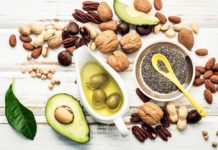
When we’re in the grips of winter and the short, dark days are upon us, we can sometimes start feeling a bit down and withdrawn. For some, this can trigger a type of seasonal depression called seasonal affective disorder, or SAD for short.
Symptoms of SAD are typically observed during the fall and winter and may include a feeling of hopelessness, fatigue, problems concentrating, and a change in appetite. Luckily, with a few small lifestyle changes during these colder months, you can stave off these symptoms and increase your overall health.
First off, as tempting as it is to pull the covers over your head on dark mornings and sleep in, try to stick to a regular sleep routine. Getting at least seven hours of sleep at night and waking up at the same time every day may help you feel more energetic and less listless during the day.
Next, try bundling up and getting outside for some brisk activity during daylight hours. Studies have shown that exercise as well as exposure to sunlight both ease symptoms of depression.
Lastly, stay social, and also try to incorporate as many seasonal ingredients into your cooking as possible. Connecting with those we care about helps to improve our mood, and cooking seasonally ensures we get the maximum nutritional benefits from our foods, which, in turn, helps us feel good inside and out.
So, get your fork ready and read on to discover a handful of delicious and nutritious meal ideas perfect for keeping your mind and body happy and healthy.
Grapefruit, Jicama, and Avocado Breakfast Salad

Sweet Potato Rosti Stack

Butternut Squash Steak

Salmon with Cucumber Grape Salsa

Golden Hot Cocoa

Seasonal delights
Choosing to eat mostly seasonally available ingredients provides us with a large number of benefits not only to our health but also to our environment and wallets.
Nutritional benefits
Plants need time to grow and ripen. Picking fruits or vegetables before they’re ripe cuts off their nutrient availability, leaving us with less nutrition once consumed. Eating seasonally ensures that the produce we enjoy is at its peak in both flavour and nutrients.
Environmental benefits
Shipping produce from other areas requires a lot of resources that not only add to the price of the food but can also negatively impact our carbon footprint. Consider supporting local growers, perhaps at a farmers’ market; it’s a great way to build community and feel more connected to where your food is coming from.
Cost benefits
In-season produce is generally more abundant and often priced better than its out-of-season counterparts.
Nutrient know-how
A great way to get the very best out of fruits and vegetables out of season is to freeze them when they’re in season so you have a stash of ripe and nutritious produce all year long.
Another way to keep your vitamin levels up during these darker and colder months is to take a daily multivitamin or other supplements to fill any nutrient gaps. It’s always a good idea to consult your health care practitioner before starting any supplement regimen.
















